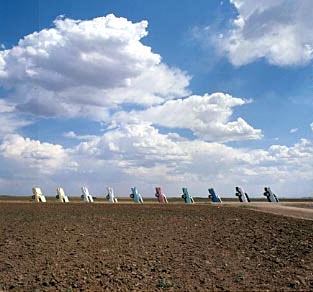How the US fell out of love with its cars
Tail fins and chrome grilles were once the
symbols of a superpower. Now, with 36,000 jobs cut in a week and foreign
vehicles filling the highways, Paul Harris in New York surveys the collapse of
an industry

“Cadillac Ranch” When I still was on the road, I used to pick up a coffee in Amarillo and stop here to drink it on the way home from West Texas. Yes, at the time I was driving an Acura RS.
In 1979 the Big Three sold nearly nine out of every 10 new vehicles on US roads. By 2004, as European and Asian firms ate away at their market, only about 50 per cent of the nation’s new cars were sold by US producers. By October 2005, cars made by the Big Three accounted for about 40 per cent of the US market, according to Forbes. Toyota, Honda and Korean Hyundai had all made inroads. Even that US archetype the truck saw 30 per cent of its market go to foreigners.
American cars were about freedom, sexual liberation and sheer confident patriotism. For young Americans a driving licence and their first Chevy or Ford was the most important rite of passage into adulthood. The car gave birth to other American icons: the motel, the advertising billboard and the diner. They were all children of the road.
Of course, the car still defines a lifestyle. Americans still buy cars by the millions, whether they are in gridlocked LA or in the middle of Kansas miles from the nearest town. But what does it mean when a country’s cultural heart is now made in Japan? Or Korea? Or Germany?
America’s tempestuous affair with the car has become a passionless marriage. Americans still need their cars, but the world has changed and they no longer really love them. Chrysler was taken over by Germany’s Daimler. Japanese firms, such as Toyota and Honda, are opening plants as Ford shuts down. Cars are not big business. Ford as a company is worth about $15bn - Google is worth $129bn.
[Rob] Latham says his students no longer see their cars as an essential expression; their Toyotas and Hondas are just vehicles. They boast of iPods or computer games, not their ‘wheels’.
‘They are like walking cyborgs with all these things attached to them. Cars have become functional. They are not statements anymore. Electronics are,’ he said.
[Chip] Lord [Cadillac Ranch sculptor] agrees: ‘Young people do not have that same set of cultural signs. Their cultural landscape is about technology and the internet, not about convertibles and driving across America.’
Posted: Mon - January 30, 2006 at 06:28 AM